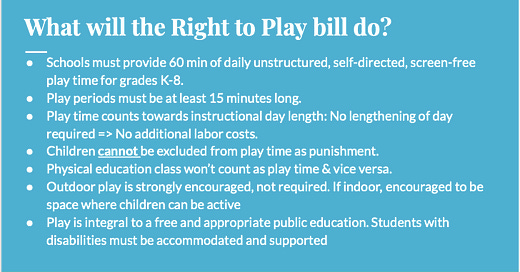Hi friends!
We are inundated with mice over at our house so it’s hard for me to think about anything else but getting them gone. If I lapse into the dreaded trap metaphors as we talk this week about the Right to Play bill, you’ll know why.
Quick note: I shall assume that if you are actually going to the bother of signing up for this newsletter, clicking it open, and reading it, that you will not need a great deal of persuasion about the efforts described herein on behalf of all our schools. In other words, I’m assuming we’re already all on the same side, and I will in no way spend time trying to bowl you over with intellect, resources, and/or snark to make my case. We’re here to get to work on things we all believe in.
But having said that, I know we live in a world that discounts and disparages the importance of play and degrades the simplicity of childhood itself. Sometimes we parents can give in to panic that our kids are doing “nothing” with unstructured open play time at school, or if they’re in a play curriculum in pre-K and Kindergarten. I was a preschool teacher for a short stint, and I could not believe the amount of flack we got from parents about how much time two year olds were given to play. In case you find yourself surrounded by folks like that, or even if you secretly deep down wonder if your 4 year old shouldn’t be getting a leg up on their Arabic and their mathematical modeling, I want to give you a few links to bolster you as you talk to influencers and lawmakers about play. Skip this section if you don’t want bolstering.
Here’s a good general readable research summary about why play is important (32 pages, many of which are cute photos of children playing).
Draft report from the 2012 ISBE task force on recess. This coincided with the successful effort by the magnificent parent-activists of COFI (Community Organizing and Family Issues) to bring recess back to CPS.
An AFT report from 2017, “Time to Play,” cites a whole ton of data from the American Academy of Pediatrics particularly on children’s declining physical health after recess started disappearing in the 1980s and 1990s.
Even old Arizona, my Blessed Homeland (I’m sure you will all be observing its entry into the union in 1912 this Friday, February 14th), has implemented recess policies and the indications are good that kids are benefiting—even their test scores are going up! If that isn’t persuasive I don’t know what is!
Finally, a clickable map that shows you what other states’ recess policies are, on a website that researches childhood obesity. (This one has the states mesmerizingly shaped like a network of hexagons; I could click on this thing all day.)
So. What is this current bill about? Here are its features in one handy dandy blue box:

So far, we have a Senate sponsor, Sen. Robert Peters, and a House sponsor, Rep. Aaron Ortiz. The bill is awaiting a number and assignment to committee. But even before that happens, there are a number of things you can do right now.
1) You can go here, to the Illinois Families for Public Schools website, and sign up for information and volunteering.
2) You can talk to your legislator about the bill. Let them know it’s coming and let them know you’re interested in their support.
3) You can reach out to appropriate professional and community orgs you’re involved with, and seek their backing for the bill—are you a doctor? A social worker? A teacher? A PTO parent? So many groups can get behind this. Think about your networks.
4) Give a holler if you have questions, if you’re dubious, whatever. Right down below. All of a sudden this platform has enabled comments for all newsletters, not just paid subscription-only ones. Huzzah! As members of our old Chicago Public Fools facebook community will remember I police the heck out of conversations—I don’t like meanness, name calling, or profanity, and I don’t allow it. But I love a really good thoughtful thread that works toward some positive place (and pointers for mouse control). So let’s chat!
Thanks for reading, thanks for signing up, and thanks for all you do for our schools and our children.


